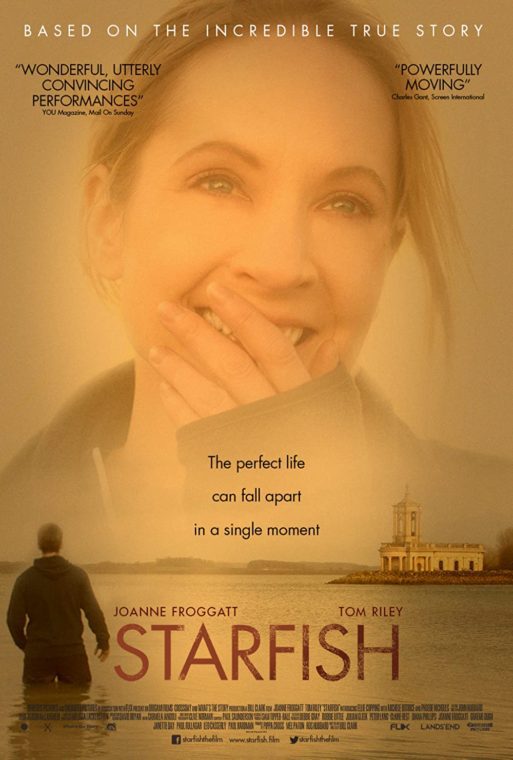 The 2016 film “Starfish,” written and directed by Bill Clark, is a heartbreaking look at the impact of serious illness on one small family in the East Midlands of England. Based on the true story of Tom Ray and his wife, Nicola, it explores how Tom Ray’s life changed forever after contracting sepsis at the age of 38 — possibly from a cut on his gum when visiting the dentist. It took five hours for doctors to diagnosis the life-threatening illness, and they had to amputate all four of his limbs and part of his face to save him. “Starfish” tells the sometimes horrific, often tearful, and occasionally heartwarming tale of how his family grappled with the consequences — including disability, disfigurement, financial hardship and relational challenges.
The 2016 film “Starfish,” written and directed by Bill Clark, is a heartbreaking look at the impact of serious illness on one small family in the East Midlands of England. Based on the true story of Tom Ray and his wife, Nicola, it explores how Tom Ray’s life changed forever after contracting sepsis at the age of 38 — possibly from a cut on his gum when visiting the dentist. It took five hours for doctors to diagnosis the life-threatening illness, and they had to amputate all four of his limbs and part of his face to save him. “Starfish” tells the sometimes horrific, often tearful, and occasionally heartwarming tale of how his family grappled with the consequences — including disability, disfigurement, financial hardship and relational challenges.

Tom Riley and Joanne Froggatt in “Starfish”
The film opens with Tom Riley (Tom Ray) playing with his young daughter at a park and engaging with his wife. His interactions with Joanne Froggatt (Nicola Ray) are warm, with plenty of kissing and other expressions of affection. Froggatt is pregnant with their second child, and in one scene — the night before everything changes — Riley rubs his hands together to warm them before placing them on her belly and whispering words of encouragement to their unborn child. “I cannot wait to meet you,” he says, “because we are going to have so much fun.”
As it turns out, “fun” is hardly the word to describe the early years of their relationship. The following morning, Riley is suffering from terrible stomach pains and nausea, which he initially blames on having eaten some expired sausage. Later in the day, he manages to call Froggatt before collapsing onto the floor; she rushes home from work and brings him to the hospital. After a lengthy waiting period, during which Riley complains of cold hands and feet and develops a strange-looking rash, he falls into a coma. The doctors eventually diagnose sepsis, and Froggatt is forced to sign papers consenting to the amputation of her husband’s lower arms and legs. Later — amid flashes of the kisses they once shared — she must also consent to the removal of parts of his face.

Tom Riley (Tom Ray) must learn to live with a facial disfigurement post-illness.
When Riley eventually wakes, it’s to a very different life. The rest of the film explores the incredible challenges he faces — learning to live with disability and disfigurement; his own daughter’s initial refusal to accept him; the loss of his house, job and independence; the inability to hold his newborn son.
But equally heart-wrenching is the impact on his wife. We watch as Froggatt grapples with raising two young children while caregiving for an incapacitated husband; her inability to make love to him; the impact of his angry outbursts and refusals to cooperate with the necessary changes in their lives.
While there’s no “happy ending” to their struggles, Riley does come to a certain peace with his condition and learns to be present for the sake of his wife and family. The film, created to raise awareness around sepsis, is a dramatic reminder to value what we have — our health, our homes, our loved ones — in whatever state they may be. “I also realized it is not all about me,” Tom Ray told the BBC of his motivation to overcome his ordeal. “I had to be there for my children — to help them with their school work and take them places. Terrible things can happen in life, but you can get through them.”
For anyone struggling with the demands of caregiving or working to overcome an ordeal of their own, “Starfish” may provide motivation to look on the brighter side. Put simply, it may make them feel less alone.

 “Starfish,” written and directed by Bill Clark
“Starfish,” written and directed by Bill Clark


 National Donate Life Month Reminds Us To Give
National Donate Life Month Reminds Us To Give
 How Dare You Die Now!
How Dare You Die Now!
 Debating Medical Aid in Dying
Debating Medical Aid in Dying














